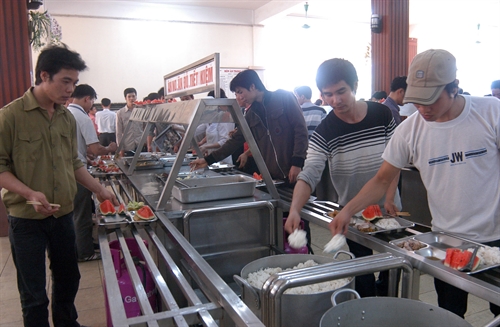 Society
Society

Many workers have not been able to access healthy and nutritious meals at their workplaces, causing massive food poisoning. In the meantime, enterprises have shown little interest in improving the situation.
 |
| A buffet meal at the Mông Dương Coal Joint Stock Company under the Việt Nam National Coal and Mineral Industries Group. Many workers in different enterprises do not have access to healthy and nutritious meals. – VNA/VNS Photo Ngọc Hà |
HÀ NỘI – Many workers have not been able to access healthy and nutritious meals at their workplaces, causing massive food poisoning. In the meantime, enterprises have shown little interest in improving the situation.
Figures from the Ministry of Health showed that on average, 17 food poisoning incidents occurred in the canteens of industrial and export processing zones annually since 2010, forcing thousands of workers to be hospitalised for treatment. The country is home to 256 industrial and export processing zones, creating jobs for over three million people.
In the first quarter of the year, eight food poisonings have been reported. The latest case was on April 21, when more than 300 workers of Minh Hưng-Korea Industrial Park in southern Bình Phước Province were taken to hospital after they fell ill with food poisoning symptoms.
Most of the food poisoning happened when enterprises hire an outside business to cook meals for their workers. Up to 70 per cent of the total cases were from poor-quality food supplied by private businesses that prepared meals for workers.
Vũ Quang Thọ, director of Việt Nam General Confederation of Labour’s Workers and Trade Union Institute said that few enterprises cared about the quality of workplace meals. Most hired a business to cook meals for their workers and ignored the origin and safety of the food provided. Some even paid money, usually a small amount of VNĐ10,000 (US$0.4) for workers to go and eat lunch elsewhere.
In the meantime, many businesses purchased poor-quality and substandard meat and vegetables at low cost to prepare meals.
Phan Minh Lý, a worker at Bắc Giang Industrial Zone, where a large-scale food poisoning occurred two months ago and put 60 workers to hospital, said that she, as well as other workers, were so worried about the quality of the food they ate everyday. However, they did not know how to resolve the situation.
Lý said many workers tried to leave jobs or go on strike, but it made little difference as enterprises would hire replacement workers.
Lý said they really hoped that the enterprises’ trade unions would organise a team to cook meals for them and manage the origin of the food they consume.
Trần Ngọc Tú, head of Hà Nội’s Department of Food Safety and Hygiene, said that there was a high risk of food poisoning at industrial zones as the transport of substandard food from other cities and provinces to the capital city remained complicated while enterprises paid little attention and money on workers’ meals.
According to experts, it is necessary to improve the awareness of both enterprises and workers to increase the quality of workplace meals.
Trade unions need to take responsibility for the preparation of meals for workers and managing the quality of food to ensure its safety.
Workers should care about their health, they said. In fact, many enterprises considered increasing the value of meals for workers, but taking that amount from their salaries. Obviously, workers refused this proposal and accepted the lower value meals, which fail to meet good standards. -- VNS




